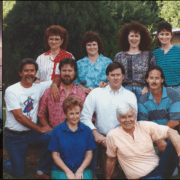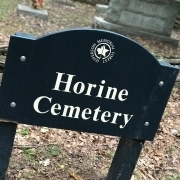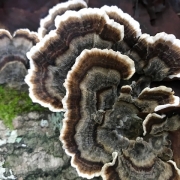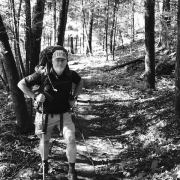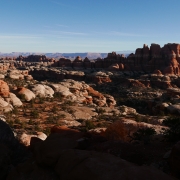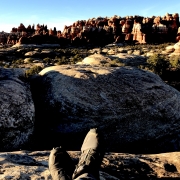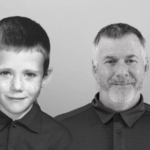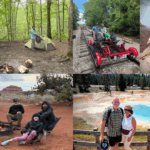Home Economics and the Temple of Doom Pt. 1 | Healthy Aging Series: S11 E26
Warning: This episode is about my Money Complex, or rather our Money Complex and is very personal. Your Money Complex is made up of all your experiences, images, and memories that you have about money, and it influences your thoughts, feelings, and behaviors about money. Your Money Complex is mostly unconscious, operating independently and sometimes leads to seemingly irrational or uncontrollable actions. We can become possessed by our Money Complex. That can be good and can be bad, Temple of Doom bad. I’m going to share what I learned from my parents, and in some cases, what I didn’t learn my parents.
My Money Complex
My mother has been gone for almost 10 years. I talk with her often. I tell her what I’m doing, and she tells me what she thinks. Thank you, Dr. Carl Jung and your Active Imagination practice. I tell the story of her death often because I was there. Because there is a sweetness to it.
My oldest brother had called and told me that Mom did not have much time left. She had been placed in the Palliative Care Unit of the hospital a few days earlier. I reached the hospital and found the waiting area quiet but packed with family members. 50 plus.
“It’s your time to sit with Mom,” my sister whispered.
When I opened the door to my mother’s room two of her grandchildren looked up and quickly let me take their place. I sat, took her hand and said, “Mom, it’s Kimmer, I’m here.”
A few minutes later, she stopped breathing. She had waited for me, her Kimmer. It was a beautiful moment. My mother had witnessed my first breath, and I had witnessed her last. It was the perfect circle.
Later, after leaving the hospital, I went to her little efficiency apartment located in a small Senior Community. I decided to stay the night there, instead of returning home. I looked around her little place. A small Lazy Boy recliner that faced a 32-inch TV. There were books stacked up next to the recliner. I doubt if there were more than ten outfits of clothing hanging in the closet. Her little apartment was tidy. There was a bookshelf that housed her books on religion, the Bible, and the life of Jesus. Most of these were written by agnostics, and some were written by atheists like Bart Ehrman. I had asked Mom years before for her Gladys Taber books, which were really journals, so those books were in my office back home. Joseph Campbell’s book, “Hero with a Thousand Faces,” which I had given her years before, was in the bookcase, so I took it with me. I took a small, knitted blanket and a clock that chimes. Those will go to my granddaughters one day.
Books, clothes, a bed, a recliner, a love seat, a 32-inch TV, pictures on the wall, Lorna Doones in the cabinets, a few dishes, some Tupperware containers, and that’s it.
The next day, we invited the grandchildren to see what they wanted. All of it was gone in a few hours. Nobody fought. Everyone wanted a small piece of a memory to take home.
Mom and Dad were Rich
As I’ve thought about my mother, I guess I would say she was poor. What was her net worth? I think she had a little bit in an account for her funeral and cremation, but I think it was less than $5,000. She had her friends at Hardee’s, a few in the small senior community, and a few at her church.
She had four daughters. They were her real net worth. She had five sons. Jeff, my oldest brother, called and spoke with her almost every day, and the rest of us spoke with her or tried to meet with her at least monthly. We were her net worth, as well. And then there were her memories of my father. She acted like she was rich, and, in her mind, she was.
She was prone to falls as she aged and after falling at a Taco Bell, she received a settlement of something close to $15,000. It might have been less. She decided that the best thing to do with it was give it all away. And she did, mostly to children and grandchildren. We suggested that she keep it, but she insisted. She died with enough to be cremated, maybe a little more, and I admire that.
Our Money Complex
It might not surprise you if I said this but, most of us were exposed to a form of Home Economics in our childhoods. We all learned about money from our parents. Dr. Carl Jung called this a Money Complex. A complex is a collection of emotionally charged ideas and images, about any given topic, that have been ingrained in our unconscious mind. Jung wrote that, when we were born, we were, in a sense, a blank slate. No complexes. The original complexes were our Mother and Father Complexes. All of the rest of our complexes originate from these two complexes. So, where did we get our Money Complex? Well, from lots of places, but originally, from our parents.
My Money Complex
I took some time to think about what I learned from Mom and Dad about money, And I’ll suggest you do the same.
Here’s what I learned in the Home Economics class that was taught by my parents.
- They always seemed to have savings. They never talked about bills and the price of things, and my assumption is because they had created a cushion.
- My father went through the Great Depression, and he never wanted to experience that again. So, he had side businesses. Growing up he said that “they never had a pot to piss in,” which I always thought was kind of funny. He bought a horse farm and intended to board horses but as he admitted later, in his brief memoir, it turned out to be a bad idea. He bought two nightclubs, one for mid-level bands and one with exotic dancers. I remember him saying that the people who worked for him stole money from the businesses, and eventually, he sold both. A couple of years later the building burned down. I know, “A bad idea,” as Towlie from South Park would say. After that I think he stayed with his day job.
- My dad worked until he could no longer work. He was a smoker and developed emphysema which caused COPD. I think he was 72 years-old when he retired. Mom and Dad lived on their Social Security.
- Dad invested early in his education. He got out of the Marine Corps and after a few years used the GI Bill to attend a trade school for industrial plumbing and air conditioning. He was hired quickly by a company called Jackson Engineering as a sales engineer. The owner, Jim Jackson, gave my father a raise after the birth of each of their children, and a yearly bonus.
- Jim Jackson died in the early 70s, and my father became the President of the company but was later forced out by the three other major stockholders. He was replaced by a son of one of the stockholders. Yeah, I know! My father lived on his stock which was about $400,000 in today’s terms for the next few years. Later, he started his own company and represented the companies that he had represented at Jackson engineering. He landed on his feet, in large part due to his reputation in the city where he lived. He was honest, good looking, and professional.
- Mom and dad were not exorbitant. In fact, they were even frugal. Dad drove a company car that he exchanged every two years. They didn’t buy a summer home in Florida. No RV. No Harley Roadster. Very few trips. I remember that his company sent them to Madrid one year. And as we got older, mom traveled out West by Greyhound, to see me in Oregon, my brother in Washington, my sisters in Las Vegas and various extended family members in New Mexico. Dad did buy a few older motorcycles to restore but it was hardly even hobby.
- Mom and Dad owned several homes throughout their life, but they also lived in several mobile homes located in trailer parks. Honestly, they were very nice homes for Mom and Dad. In 2005, a tornado destroyed their trailer, and we feared that they were dead. Thankfully, they were found alive and went through rehab and later appeared on the Bill O’Reilly show. Their insurance replaced the home and state and local agencies, some public and some private, replaced almost everything else. When dad passed away in 2008 most of us were in the living room of that replacement-mobile home.
- My parent spent most of their money raising nine children. We went to Catholic Schools until 1964 and then public schools. They bought and raised horses for us, and we received riding lessons. When we lived on a farm in rural Warrick County, they bought the boys motorcycles, shotguns, and a new pickup truck. They paid for our school lunches and our school clothes every year but expected us to work when we turned sixteen-years old, for our own spending money. They paid for gas for the pickup to drive to school and run errands for mom. Having raised just two children, I can’t imagine what it cost to raise nine.
- Dad received somewhere close to $100,000 in today’s terms from my grandmother after she sold my grandfather’s farm. As I said earlier, they were very poor during the Depression, but my grandfather was a farmer his whole life and was able to accumulate a modest amount of wealth from farming. She shared that with her five children.
- I don’t remember any conversations with my father or mother about money. I don’t remember being counseled to save money. I don’t remember any conversations about credit cards. I do remember my mother explaining that they would not be able to help with college because they couldn’t help all of us, so they wouldn’t be able to help one or two of us. So, I joined the Air Force and used the GI bill just like my father.
- I went to work with my father at Jackson Engineering after graduating from high school. I loved working with my father and admired him. His blue eyes and beautiful smile. I loved being seen with him. We would go to lunch together every day and I loved how the servers treated him. I’m sure he was disappointed when I told him I was joining the Air Force, but on the way to the Greyhound Station, he told me that he envied me. I think I knew what he meant. James Hollis, a Jungian Analyst, writes that we are all living out our parents unfulfilled dreams.
There isn’t much more to say about my Home Economics Class, my Childhood Money Complex.
Obviously, I’ve learned a lot about money over these past 50 years, but there’s no question that what I learned from my parents about money still influences me today. All nine of us, I’m sure, have a different Money Complex from our early childhood, because in a sense, we were raised by different parents.
Are you a saver? Do you find yourself spending money impulsively? Do you feel guilty when you spend money? Do you have a ‘pay yourself first and spend the rest’ philosophy? Are you generous with your money? Do you give to charities?
These are just a few of the ways that your parents live through you today by the means of your Money Complex.
And it’s possible that this Complex has contributed to your Temple of Doom.
In the next episode, which is Part 2 of “Home Economics and the Temple of Doom,” I share some different ways of looking at money. One from a Fairy Tale. One from the Hebrew Scriptures. One from a book (Die with Zero). One from Stoicism. Stay tuned.

